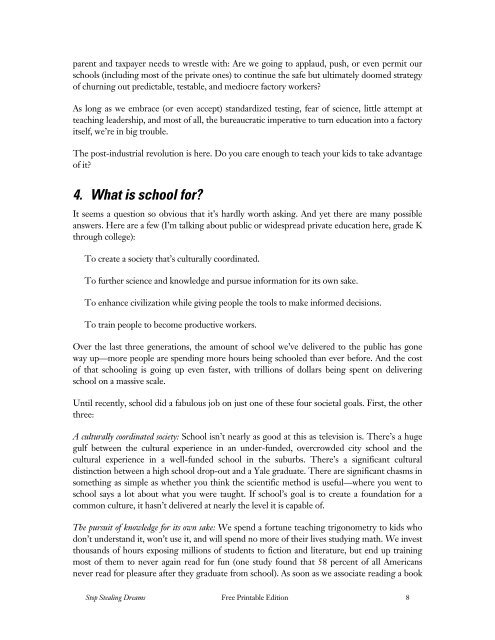1DO0vxU
1DO0vxU
1DO0vxU
Create successful ePaper yourself
Turn your PDF publications into a flip-book with our unique Google optimized e-Paper software.
parent and taxpayer needs to wrestle with: Are we going to applaud, push, or even permit our<br />
schools (including most of the private ones) to continue the safe but ultimately doomed strategy<br />
of churning out predictable, testable, and mediocre factory workers?<br />
As long as we embrace (or even accept) standardized testing, fear of science, little attempt at<br />
teaching leadership, and most of all, the bureaucratic imperative to turn education into a factory<br />
itself, we’re in big trouble.<br />
The post-industrial revolution is here. Do you care enough to teach your kids to take advantage<br />
of it?<br />
4. What is school for?<br />
It seems a question so obvious that it’s hardly worth asking. And yet there are many possible<br />
answers. Here are a few (I’m talking about public or widespread private education here, grade K<br />
through college):<br />
To create a society that’s culturally coordinated.<br />
To further science and knowledge and pursue information for its own sake.<br />
To enhance civilization while giving people the tools to make informed decisions.<br />
To train people to become productive workers.<br />
Over the last three generations, the amount of school we’ve delivered to the public has gone<br />
way up—more people are spending more hours being schooled than ever before. And the cost<br />
of that schooling is going up even faster, with trillions of dollars being spent on delivering<br />
school on a massive scale.<br />
Until recently, school did a fabulous job on just one of these four societal goals. First, the other<br />
three:<br />
A culturally coordinated society: School isn’t nearly as good at this as television is. There’s a huge<br />
gulf between the cultural experience in an under-funded, overcrowded city school and the<br />
cultural experience in a well-funded school in the suburbs. There’s a significant cultural<br />
distinction between a high school drop-out and a Yale graduate. There are significant chasms in<br />
something as simple as whether you think the scientific method is useful—where you went to<br />
school says a lot about what you were taught. If school’s goal is to create a foundation for a<br />
common culture, it hasn’t delivered at nearly the level it is capable of.<br />
The pursuit of knowledge for its own sake: We spend a fortune teaching trigonometry to kids who<br />
don’t understand it, won’t use it, and will spend no more of their lives studying math. We invest<br />
thousands of hours exposing millions of students to fiction and literature, but end up training<br />
most of them to never again read for fun (one study found that 58 percent of all Americans<br />
never read for pleasure after they graduate from school). As soon as we associate reading a book<br />
Stop Stealing Dreams Free Printable Edition 8


